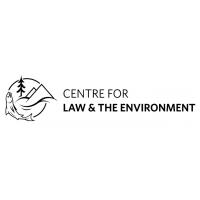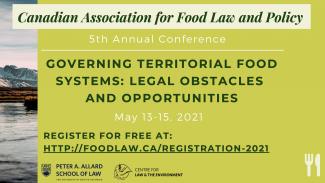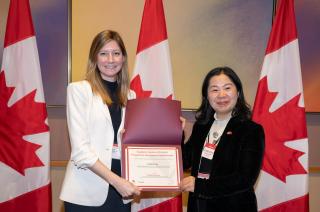Canadian Association for Food Law and Policy 5th Annual Conference: "Governing Territorial Food Systems: Legal Obstacles and Opportunities"

Centre for the Law and the Environment Assistant
May 4, 2021

Register for this exciting conference, one of Canada's most thought-provoking forums on food systems!
Food systems in Canada are facing a multiplicity of legal and regulatory challenges. These challenges include balancing interests such as: ensuring food system sustainability; promoting economic viability; respecting Indigenous (food) sovereignty; ensuring access to land- and sea-based country foods; minimizing the impacts of industrial development on Indigenous trapline territories; incentivizing land use for food production or for alternative crops (cannabis, wine, agrofuels etc.); addressing the climate crisis; supporting industrial or agroecological food production; ensuring food security; promoting informed consumer choice; enhancing agribusinesses’ competitiveness and access to markets; and so on. These examples highlight potentially competing demands and pressures, as well as conflicting views of how and for whom food systems should be governed and along what geographic and political divides.
The concept of territorial food systems offers one way to understand these challenges. Territorial food systems locate food production, processing, distribution, consumption and disposal at the scale of a particular territory. They represent a place-based vision in which food systems reflect local circumstances and priorities, share economic benefits equitably throughout value chains, support innovative and community-based business models, promote human health and ecological sustainability, and improve democratic governance and local autonomy. Territorial food systems have obvious legal implications, but lawyers have been slow to the table, and the regulatory dimensions of territorial food systems are under-explored.
This conference will examine the legal obstacles and opportunities of building and governing territorial food systems as a means of addressing these concerns, and shaping food system futures to ensure they are not only more sustainable and climate-friendly, but more just, healthful, democratic, vibrant and tailored to the landscapes people inhabit. We will ask: How can law and policy be used to build territorial food systems that balance competing interests (while questioning to the extent to which these interests are or need to be in competition with each other)? What can we learn from the experiences of British Columbia in regulating local food systems, preserving agricultural land and promoting a bioregional approach?
For the first time, the CAFLP conference will be based out of the West Coast. In addition to addressing a variety of pressing issues in food law and policy, our fifth conference offers a unique opportunity to explore BC as a case study in territorial food system governance. This includes Indigenous food sovereignty and food systems governance models, the regulation of ocean foods and the ocean economy, and the challenges and opportunities of local food systems governance, among many other issues.
The conference will be hosted virtually on the traditional, ancestral and unceded territory of the xʷməθkʷəy̓əm (Musqueam) Nation. We are grateful to be guests on this land.
Visit http://foodlaw.ca/schedule-2021 for a detailed conference schedule. Speakers and events include:
- A keynote speech by Haida lawyer and artist Terri-Lynn Williams-Davidson, Gid7ahl Gudsllaay
- A cooking class with chef Scott Iserhoff of Pei Pei Chei Ow contemporary Indigenous cuisine (there is a small charge for this event)
- A screening and discussion of Alanis Obomsawin's film Is the Crown at War With Us?
- A panel discussion on Indigenous Territorialities and Food System Governance including professor Darcy Lindberg (Plains Cree ancestry) of the University of Alberta and Sierra Club of BC Executive Director, Hannah Askew
- A panel discussion of the latest developments in food law and policy, including Angela D'Elia Decembrini of First Peoples Law and other lawyers
- A panel discussion on BC Food Systems Governance
- A panel discussion on the impacts of COVID-19 on food systems
- A panel discussion on governing territorial food systems, including Lauren Martin of the Canadian Cattlemen's Association and Dawn Morrison of the Indigenous Food Systems Network.
Join us for some or all of these exciting events!
- Centre for Law and the Environment


